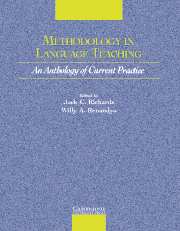Book contents
- Frontmatter
- Contents
- Acknowledgments
- Introduction
- Section I Approaches to Teaching
- Section 2 Lesson Planning and Classroom Management
- Section 3 Classroom Dynamics
- Section 4 Syllabus Design and Instructional Materials
- Section 5 Task and Project Work
- Section 6 Learning Strategies
- Section 7 Teaching Grammar
- Section 8 Teaching Pronunciation
- Section 9 Teaching Speaking
- Section 10 Teaching Listening
- Section 11 Teaching Vocabulary
- Section 12 Teaching Reading
- Chapter 26 Dilemmas for the Development of Second Language Reading Abilities
- Chapter 27 Teaching Strategic Reading
- Chapter 28 Extensive Reading: Why Aren't We All Doing It?
- Section 13 Teaching Writing
- Section 14 Assessment
- Section 15 Technologies in the Classroom
- Section 16 Professional Development
- Credits
- Author Index
- Subject Index
- References
Chapter 27 - Teaching Strategic Reading
Published online by Cambridge University Press: 10 November 2010
- Frontmatter
- Contents
- Acknowledgments
- Introduction
- Section I Approaches to Teaching
- Section 2 Lesson Planning and Classroom Management
- Section 3 Classroom Dynamics
- Section 4 Syllabus Design and Instructional Materials
- Section 5 Task and Project Work
- Section 6 Learning Strategies
- Section 7 Teaching Grammar
- Section 8 Teaching Pronunciation
- Section 9 Teaching Speaking
- Section 10 Teaching Listening
- Section 11 Teaching Vocabulary
- Section 12 Teaching Reading
- Chapter 26 Dilemmas for the Development of Second Language Reading Abilities
- Chapter 27 Teaching Strategic Reading
- Chapter 28 Extensive Reading: Why Aren't We All Doing It?
- Section 13 Teaching Writing
- Section 14 Assessment
- Section 15 Technologies in the Classroom
- Section 16 Professional Development
- Credits
- Author Index
- Subject Index
- References
Summary
Mircea is a conscientious student. When he is told he will be tested on the contents of Chapter 2 in the textbook, he looks up every unknown word in the dictionary in an effort to fix the information in his memory. Despite his extended preparations, he doesn't do very well on the test, though he says he spent hours preparing. Lia, on the other hand, excels on the exam, but she has approached the text in a very different way. Before she reads the chapter, she skims through it, looking at subheadings and graphics so as to give herself a general idea of what the text will be about. As she reads, she connects the material in the chapter to what she already knows. She frequently asks herself questions about the text, looking back or ahead to link one part of the text to another. When she is puzzled by the content, she searches for clues in the context, tries to paraphrase, or considers what she knows about text structure. In short, Lia is reading like an expert, while Mircea is relying on just one technique. The difference between the two is in their use of reading strategies.
IMPLICATIONS OF READING STRATEGY RESEARCH FOR TEACHERS
Reading strategies can be defined as “plans for solving problems encountered in constructing meaning” (Duffy, 1993, p. 232).
Information
- Type
- Chapter
- Information
- Methodology in Language TeachingAn Anthology of Current Practice, pp. 287 - 294Publisher: Cambridge University PressPrint publication year: 2002
References
Accessibility standard: Unknown
Why this information is here
This section outlines the accessibility features of this content - including support for screen readers, full keyboard navigation and high-contrast display options. This may not be relevant for you.Accessibility Information
- 11
- Cited by
